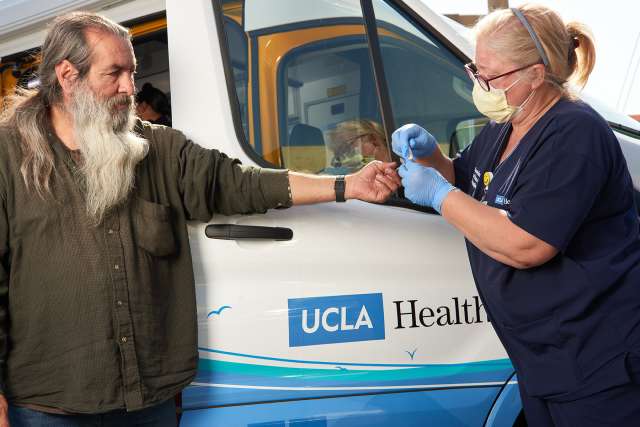Caring for a Vulnerable Community
Living on the streets can take more than 20 years off of one’s life. Unhoused individuals are more likely to experience a range of health conditions including high blood pressure, asthma, diabetes, HIV/AIDS and tuberculosis. They’re also more likely to live in dangerous conditions, which puts them at a higher risk of complications from medical problems.
But many of these health issues can be managed or improved with proper care. By preventing and treating these conditions, we help people avoid hospitalizations and enjoy better health.
Customized Street Medicine Care that Makes a Difference
Our team is committed to delivering care that’s tailored to the needs of unhoused individuals. To determine the most pressing health and social needs among people experiencing homelessness, our team has studied more than 15,000 patient records from UCLA Health emergency departments (EDs).

Our analysis showed that more than 85% of ED visits were due to primary or urgent care conditions that can be prevented or treated in the community. We used this data to shape our street medicine services and deliver more effective, holistic care. Some of the most common services we offer include:
- Medical screenings for common conditions including diabetes and high blood pressure
- Continuity care for chronic medical conditions, such as hypertension and asthma
- Preventive care and vaccinations
- Pediatric care for children of all ages
- Care for illnesses such as upper respiratory infections and sinus infections
- Psychiatric care and mental health services, including medication management, counseling, and crisis response and support
- Urgent care and treatments for many conditions, including rash, edema (swelling), wound care and back pain
- Referrals to housing and social services
In 2023, we provided clinical care to more than 3,500 unhoused patients. Our staff gave away more than 11,300 items including water bottles, snack kits, hygiene kits, Narcan boxes, blankets and socks. To improve access to valuable services, we delivered almost 700 referrals to housing, transportation and other resources. By meeting each patient where they are and improving access to high-quality, individualized care, our team is making a difference in the lives of thousands of people each year.
Our Care Philosophy
Our unique care model enables us to address the needs of unhoused individuals, regardless of their insurance coverage, immigration status or other factors. We offer:
- Excellent, trauma-informed care: Our street medicine care model is unlike any other in L.A. County. Our team cares for everyone who needs our assistance — we don’t turn anyone away. We’re committed to removing barriers and expanding access to care.
- Convenience and accessibility: Our mobile clinics travel directly to people experiencing homelessness on the streets and in shelters, encampments, interim housing sites, libraries and soup kitchens. We deliver care seven days a week.
- Large capacity for care: We have multiple full-time teams dedicated to our work. Our specially trained community health workers, doctors, nurse practitioners, physician assistants, social workers and nurses treat thousands of people each year, with more than 18,000 encounters in 2023 alone. We plan to add more specialty care services and additional mobile health vans to accommodate the needs of the Los Angeles community.
- Comprehensive pediatric care: Our skilled team treats unhoused people of all ages, including children. We provide mobile pediatric services at special events and local schools. Services include preventive care, vaccines and well-child checkups.
- Psychiatry and mental health services: We are proud to offer street-based psychiatric care. Through this specialty service, our team focuses on addressing the mental health needs of our patients. We deliver knowledgeable, trauma-informed care with respect and compassion.

Support Us
We rely on your donations to make our work possible.
